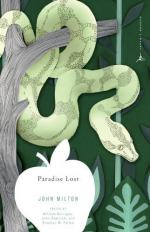|
This section contains 4,717 words (approx. 12 pages at 400 words per page) |

|
In the following essay, Johnson examines ways that Milton uses such elements of language as symbolism, irony, ambiguity, and even puns in Paradise Lost to evoke images of innocence and the loss of innocence.
We cannot enter the Garden of Eden in Book 4 of Paradise Lost and look upon the "mysterious parts" of the innocent Adam and Eve or upon Eve's "wanton ringlets" in a spirit of complete simplicity and purity: not only do we observe with the fallen Satan as our companion, but our perceptions, including those of the poet himself, are subject to the complex connotations and associations which characterize our use of language. To some, "words alone are certain good" but not to the epic's narrator, who, as if acknowledging the hopelessness of painting a credible verbal picture of innocent life, continually calls attention to the "guilty shame" and "dishonest shame" that evoke innocence...
|
This section contains 4,717 words (approx. 12 pages at 400 words per page) |

|




